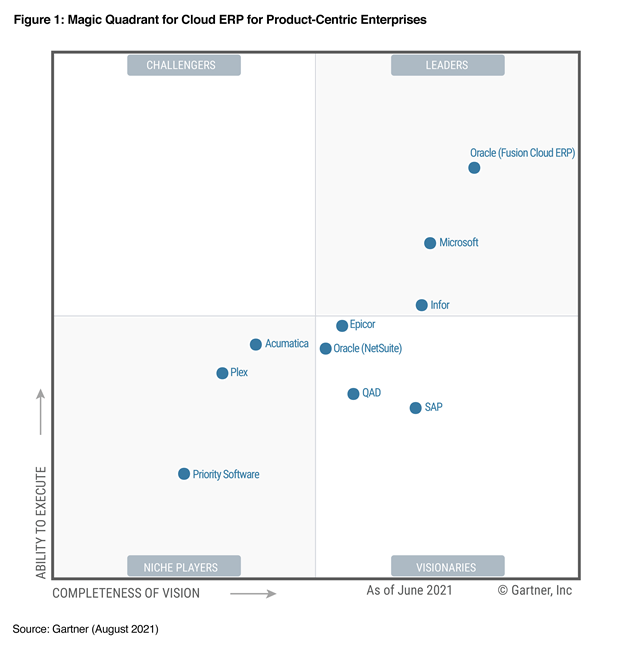Gartner® Recognizes Microsoft as a Leader in the 2021 Gartner Magic Quadrant™ for Cloud ERP for Product-Centric Enterprises
In a recent blog, Microsoft reports that the Gartner Group has recognized Microsoft Dynamics 365 as a “Leader” in their 2021 Magic Quadrant for Cloud ERP Product-Centric Enterprises. In the Gartner analysis, 20 top software providers are placed into one of four “Magic Quadrant” categories, depending on Gartner’s view of their capabilities. These four categories are: Leaders, Challengers, Niche Players and Visionaries. “Leaders”, as in the case of Microsoft Dynamics 365, are those ERP solutions that are ranked by Gartner in the highest quadrant for both completeness of vision, and ability to execute on that vision.
Gartner describes Microsoft Dynamics 365 as being aimed primarily at midsize and large enterprises and may also be suitable for global enterprises that need highly specific regional and industry capabilities, partly because of Dynamics’ large ecosystem of partners and independent software vendor solutions that are tailored to specific industries and the unique challenges within them.
The strengths of Dynamics 365, according to Gartner’s analysis included:
- A consistent cloud and platform approach: Microsoft Dynamics 365 runs on the Microsoft Azure cloud, with global reach and support.
- Integration capabilities: Microsoft has invested in robust integration capabilities that enable data sharing across Microsoft and Partner applications.
- Increased adoption by large, product-centric enterprises: Gartner estimates that implementation rates for the full suite of Microsoft Dynamics 365 products have grown by more than industry rates, year over year, within the company’s target market of large enterprises.

What is Microsoft Dynamics 365?
Microsoft Dynamics 365 is a standardized enterprise resource planning (ERP) system, operating either as stand-alone solutions or as one tightly integrated and extensible system. “As product-centric enterprises look to renovate their existing ERP platform to improve systems and processes by moving them to the cloud, Dynamics 365 is enabling the transformation and improving IT agility to deliver business outcomes in the process” says Microsoft. Amongst other planning assumptions for this analysis, Gartner stated that “By 2023, organizations that have successfully renovated their ERP platforms will achieve at least a 40% improvement in IT agility to deliver business outcomes”.
Microsoft cites a couple examples of companies that recently selected Dynamics 365 Finance and Dynamics 365 Supply Chain Management to upgrade from legacy systems that, in one case, was highly customized and difficult to update. The user company was able to integrate its data and more easily manage its supply chain and finance operations to respond more quickly to changes in the market.
Dynamics 365 runs on the Microsoft Azure cloud, which can enable clients to use apps such as Microsoft Power Platform for analytics and Microsoft Power Apps for low-code/no-code extensions, providing real-time, AI-based predictive insights across a broader ERP strategy.
How can Microsoft Dynamics 365 help Publishers?
Microsoft continuously invests in Dynamics 365 to expand its core capabilities of supply chain and financial applications, to protect and future-proof the investment made in the software by its users. On top of this there is Microsoft’s global array of industry specific partners, like The knk Group for example, who are solely focused on applying Dynamics 365 to the publishing and media industries. The knk Group builds and implements their own publishing-specific software, built on the core capabilities and standards in Dynamics 365, and is a Gold-Certified Microsoft partner operating in three continents, offering the only Microsoft-certified software for the publishing industry globally.
In this way, Microsoft and its partners like The knk Group can further help their clients become insight-driven and enable their business leaders to take strategic actions based on responsive information systems. For example, in August, knk introduced knk365 to the North American market, a new Customer Engagement and AI-based application allowing publishers to build a robust, direct and life-long relationship with their customers, augmenting the value that each client derives from the knkPublishing software.
About knk
The knk Group is an international company with headquarters in Kiel, Germany, with about 450 company users globally. The knk Group consists of knk Business Software AG, the business unit Mueller-Prange, knk Customer Engagement GmbH, knk Cloud Services GmbH and Bradbury Phillips International, in addition to knk Software LP (USA), knk Software Ltd. (UK) and knk France SAS (France). With our solutions and services within the group, we support publishers and media companies in effectively leveraging the opportunities provided by digitalization and current developments in the industry, optimizing workflows, and reaching new target groups. The focus here is on new content-based business models, business intelligence and artificial intelligence for publishers, CRM, social media marketing, and marketing automation.
As a seven-time certified Microsoft partner, knk stands for professional and consulting expertise, modern technology, and many years of experience in project and change management.
Referenced links:
GARTNER and Magic Quadrant are registered trademarks and service mark of Gartner, Inc. and/or its affiliates in the U.S. and internationally and are used in the Microsoft blog with permission. All rights reserved. Gartner does not endorse any vendor, product or service depicted in its research publications, and does not advise technology users to select only those vendors with the highest ratings or other designation. Gartner research publications consist of the opinions of Gartner’s research organization and should not be construed as statements of fact. Gartner disclaims all warranties, expressed or implied, with respect to this research, including any warranties of merchantability or fitness for a particular purpose.
The knk blog team fills the knk blog with content, new posts and replies to comments.
We welcome your comments!

Leave A Comment